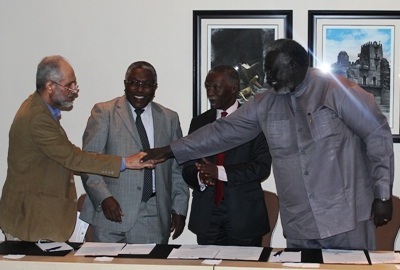Sudan’s dialogue appears to be attempt to reunite Islamists: Attabani
October 24, 2014 (KHARTOUM) – The leader of the opposition Reform Now Movement (RNM) called for an inclusive process to end war in Sudan and achieve democratic reforms, saying the current situation surrounding the country’s national dialogue suggests its main purpose is to reunite Islamist factions.

Attabani further regretted that the dialogue process proposed by president Bashir since last January “has lost some of the most important parties rather than to attract new” political participants.
He said that the opposition National Umma Party (NUP) presented an objective justification for its decision to quit the national dialogue process last May after the arrest of its leader Sadiq al-Mahdi
“However the document signed in Addis Ababa offers a glimmer of hope; if properly used, to persuade armed groups to participate in the ongoing dialogue,” he added.
The RNM is among the opposition forces participating in the national dialogue process.
Its chairman, Attabani, was one of two members of the dialogues committee who signed the agreement on the national dialogue and constitutional process with the African Union High Level Implementation Panel (AUHIP) on 4 September.
The same agreement was endorsed by the Sudanese rebel groups and the National Umma Party (NUP).
The reformist leader stressed that there is a need to agree on the purpose of the dialogue saying there are two ideas about it. The first is strategic one, aiming to reach a social contract to establish a democratic and plural state
“But there is also what some leaders of the National Congress (Party) hint sometimes or (clearly) state . They say they called for the dialogue. And, it is a dialogue proposed for the political forces wishing to participate (in this process) during a specified time limit, pointing that elections are rapidly approaching and they will stop the dialogue,” he said.
“Such position can be seen as tactical,” he emphasised .
Attabani who broke away from the ruling National Congress Party (NCP) in December 2013 did not attend the opening session of his former party, unlike the former NCP godfather and leader of the opposition Popular Congress PartyHassan al-Turabi.
In addition, he spoke about the neutral role that the president is supposed to play, disclosing that it was agreed in the first meeting of the general assembly of 6 April to name the coordination committee of the national dialogue (7+1+7).
He added “they” quickly removed the “1” and called it (7+7) committee.
The “1” was supposed to be an arbiter between the two groups and not to back a partisan attitude, he stressed.
The second national dialogue general assembly is expected to hold a meeting on 2 November.
Last Thursday, president al-Bashir announced that the meeting will endorse Addis Ababa agreement and called on the rebel groups to join the process.
However, the government refuses postpone the general elections of April 2015 and propose to form a NCP-led government to implement the outcome of the dialogue process.
(ST)
